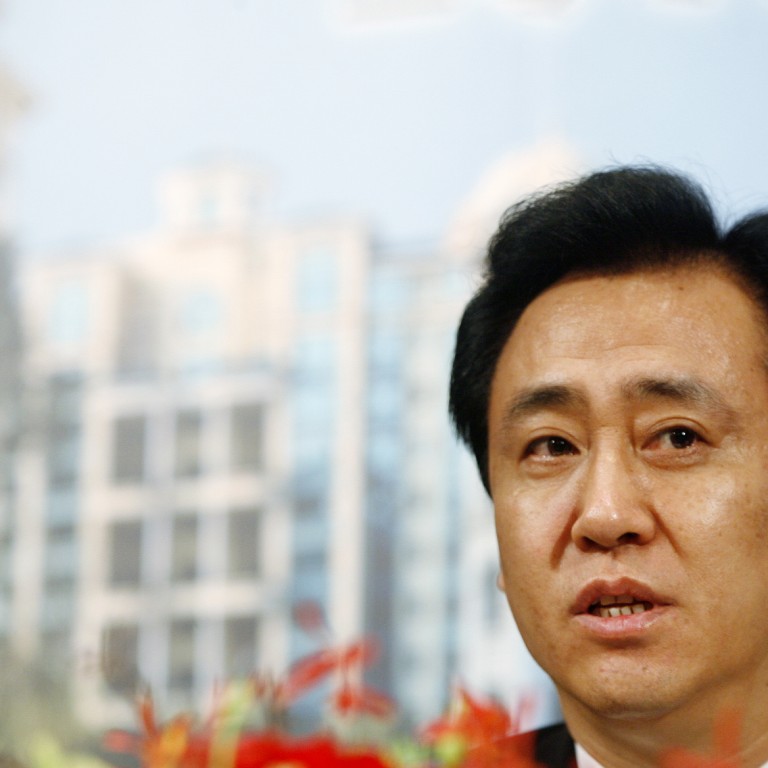
Evergrande puzzles with buy-back on one hand, borrowing on the other
Evergrande’s spending may be a measure to boost confidence to help the sale of its own financial products and raise the share price
What kind of management pays more than HK$500 million to buy back its own shares while scrambling for the same amount through an expensive seven-month loan?
Evergrande Real Estate Group chairman Hui Ka-yan knows best. That puzzling example of financial management is exactly what the Guangzhou developer has been doing for the past week.
The firm is trying to raise 500 million yuan (HK$625 million) through a trust loan of seven-month maturity, according to an offering document issued by Zhongrong Trust.
"I wouldn't do such a short-term borrowing unless I'm desperate for cash," said the financial controller of a listed company. "The service charge is the same, regardless of the maturity."
Trust loans have been a major source of funding for Evergrande for the past two years. But the latest offering is the shortest maturity of its known trust lending so far.
Evergrande’s share price has outperformed both the Hang Seng Index and its rivals
It is also way below the market average. Increasing risk awareness drove the average down to 1.84 years in the first half of the year from 1.99 in the first half of last year.
While the loan is short, the interest isn't cheap. Evergrande is offering an annual rate of 8.7 per cent to 9 per cent. That is the same it offered in late May for a trust loan of 15 months.
This type of short-term financing is not at all surprising nowadays to players in the real estate market. It can be a matter of life and death. This is because mainland banks no longer approve new loans to developers until old ones are repaid.
Say you owe banks A, B and C 500 million yuan each. You repay A with a short-term trust loan. Bank A lends you 500 million for three years. You repay B and get another three-year loan to repay C and so on and so forth.
That not only buys you a huge amount of breathing space but also a good track record with the bankers.
Whether that is the case for Evergrande is not known. Its grandiose borrowing is, however, no secret.
On its way to turning itself into one of the mainland's largest developers, Evergrande had acquired a debt of 134 billion yuan by the end of last year. Its gearing ratio is expected to reach 240 per cent this year.
What matters is not just the size of the debt but also the interest it is paying.
Most illustrative is the 25 billion yuan perpetual bond it issued last year. The coupon rate, which starts at 10 per cent in the first year, will step up from year two onwards until it reaches a cap of 15 per cent to 16 per cent, according to research reports citing company management.
How is it going to pay? That concern caused Standard & Poor's to downgrade Evergrande's rating from BB to BB-minus in May.
Any prudent businessman would be sweating, but not Hui.
Evergrande has spent HK$544 million on share buy-backs this week. That's on top of a generous HK$7.6 billion dividend payment last month, a HK$3.8 billion share buy-back in February and a HK$3 billion special dividend payment in November.
Hui has also been telling his staff that he plans to turn the company's soccer, water and malls business into a 100 billion yuan empire, according to various media reports.
Is the spending a confidence-boosting measure, like the stunning display of a peacock?
Hui is seen by many mainlanders as an "idol" for building an empire and, more importantly, a winning soccer team, from scratch.
Believe it or not, that helps in the sale of Evergrande's financial products and the doubling of its bankers' list last year.
A weak share price wouldn't go very well with his daring hero legend, and Evergrande's share price has outperformed both the Hang Seng Index and its rivals, with an 18 per cent gain so far this year.
Or is the spending to do with Hui's personal finances? Hui has repeatedly denied any share pledge that makes a strong share price necessary.
Anyway, the earlier share buy-back boosted his stake from 63.4 per cent to 70 per cent. That allows Hui to pocket a 5.3 billion yuan dividend payout.
Investors and creditors looking for a clue from company management will find little comfort.
Evergrande executive vice-chairman and president Xia Haijun has sold 80 per cent of his holding, cashing in HK$300 million.

